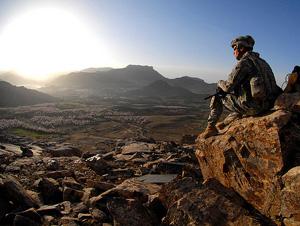Report claims al-Qaeda greatly weakened
U.S. Army Sgt. Robert Newman watches sunrise in Afghanistan. (Image: Flickr user Army.mil (cc: by-nc-sa))
Pursuing al-Qaeda remains a US priority. The pursuit spreads out from Afghanistan and Pakistan to many countries around the world. The “Guardian” newspaper in Britain recently published a current assessment of the al-Qaeda threat. It concluded that al-Qaeda’s network has been weakened greatly since 2001.
Ian Black co-wrote “The Guardian article,” which began with a description of a telling encounter between al-Qaeda recruits in Western Europe and their handler in Pakistan:
“Well this is an account of some volunteers who went from Belgium and France to Pakistan towards the end of last year,” said Black. “And they described in their subsequent interrogation — after they’d been arrested on their return — the circumstances of their reception, and the picture they painted was one that was pretty chaotic.
“They were not well received. They had to pay for their own weapons, ammunition … accommodation. And they had high hopes of taking part in Jihad; maybe meeting Osama bin Laden; but all that they did was to have some basic small arms training and physical exercise and religion instruction from a fairly junior cleric. And according to our account, they complained to the al-Qaeda handler who was looking after them that they had been deceived — that the material they’d seen were misleading, it was a trick, and they ended up returning home disillusioned and are currently facing trail.”
Black bases his assessment on the fact that, “For the last four years there hasn’t been a major incident in the Western world carried out by al-Qaeda. They’ve tried on a couple of occasions but they failed. And the failure to make an impact in terms of … their own propaganda, their own appeal to likely recruits — most experts believe has been damaging to their reputation, to their ability to attract new fighters.”
While many al-Qaeda leaders have been rounded up, its key leader, Osama bin Laden, is still on the loose. Black believes the weakened state of al-Qaeda and its crumbling alliance with the Taliban may aid in tracking down bin Laden:
“I have spoken experts, including one who was recently in Waziristan and the Pakistan tribal areas, who believes that one of the most significant developments of recent times is a fraying, a weakening, of the alliance between al-Qaeda and the Taliban. And if that is the case that may prove easier — it’s likely to prove easier — to acquire the sort of intelligence that the US and its allies are seeking in order to track down, to rest, or doubtless to kill bin Laden as other senior al-Qaeda figures have been eliminated.”
Additionally, said Black, Al-Qaeda’s anti-American, anti-Israel ideology is also waning, “There’s no doubt that … people who really believe in al-Qaeda are uncompromising in their attitudes to America, to Israel, to Christians, to Jews, to crusaders and Zionists — to use their own terminology. I don’t have any question of that, but the larger question I think is to what extent those messages appeal to significant numbers of people; that public opinion doesn’t support it in the way that it did perhaps in the immediate aftermath of 9/11.”
Produced by the world’s most respected news source, the BBC World Service is a 24-hour news service that gives listeners access to the latest world news, expert analysis, commentary, features, and interviews on issues of the day. Distributed exclusively in the U.S. by PRI.
